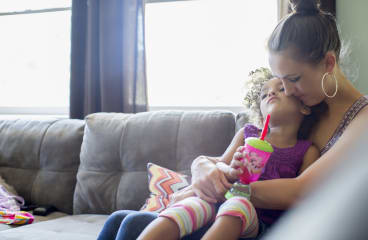Overview

Diarrhea is loose, watery stools (bowel movements). Your child gets diarrhea when the intestines push stools through before the body can soak up the water in the stools. It causes your child to have bowel movements more often.
Almost everyone has diarrhea now and then. It usually isn't serious. Diarrhea often is the body's way of getting rid of the bacteria or toxins that cause the diarrhea. But if your child has diarrhea, watch your child closely. Children can get dehydrated quickly if they lose too much fluid through diarrhea. Sometimes they can't drink enough fluids to replace lost fluids.
The doctor has checked your child carefully, but problems can develop later. If you notice any problems or new symptoms, get medical treatment right away .
Follow-up care is a key part of your child's treatment and safety. Be sure to make and go to all appointments, and call your doctor if your child is having problems. It's also a good idea to know your child's test results and keep a list of the medicines your child takes.
How can you care for your child at home?
- Watch for and treat signs of dehydration, which means the body has lost too much water. As your child becomes dehydrated, thirst increases, and the mouth or eyes may feel very dry. Your child may also lack energy and want to be held a lot. And your child will not need to urinate as often as usual.
- When your child feels like eating, start with small amounts of familiar food. You can try offering a snack or small meal every 3 to 4 hours.
- Limit foods that contain sugar, lactose, fructose, high-fructose corn syrup, and sorbitol. Avoid offering spicy foods if they make your child's diarrhea worse. And avoid giving your child caffeine.
- If your child is dehydrated, give your child an oral rehydration solution, such as Pedialyte or Infalyte, to replace fluid lost from diarrhea. These drinks contain the right mix of salt, sugar, and minerals to help correct dehydration. You can buy them at drugstores or grocery stores in the baby care section. Give these drinks to your child as long as your child has diarrhea. Do not use these drinks as the only source of liquids or food for more than 12 to 24 hours.
- Do not give your child over-the-counter antidiarrhea or upset-stomach medicines without talking to your doctor first. Pepto-Bismol or other medicines may contain salicylates, a form of aspirin. Do not give aspirin to children and teens. Aspirin has been linked to Reye syndrome, a rare but serious illness.
- Wash your hands after you change diapers and before you touch food. Have your child wash their hands after using the toilet and before eating.
- Make sure that your child rests. Keep your child at home until any fever is gone.
- If your child is younger than age 2 or weighs less than 24 pounds, follow your doctor's advice about the amount of medicine to give your child.
When should you call for help?
Call 911 anytime you think your child may need emergency care. For example, call if:
- Your child passes out (loses consciousness).
- Your child is confused, doesn't know where they are, or is extremely sleepy or hard to wake up.
- Your child passes maroon or very bloody stools.
Contact your doctor now or seek immediate medical care if:
- Your child has signs of needing more fluids. These signs include sunken eyes with few tears, a dry mouth with little or no spit, and little or no urine for 6 or more hours.
- Your child does not want to eat or drink.
- Your child has new or worse belly pain.
- Your child's stools are black and look like tar, are pale or white, or have streaks of blood.
- Your child has a new or higher fever.
- Your child has severe diarrhea. (This means large, loose bowel movements every 1 to 2 hours.)
Watch closely for changes in your child's health, and be sure to contact your doctor if:
- Your child's diarrhea is getting worse.
- Your child is not getting better after 2 days (48 hours).
- You have questions or are worried about your child's illness.
Where can you learn more?
Go to http://www.healthwise.net/patientEd
Enter L355 in the search box to learn more about "Diarrhea in Children: Care Instructions".
Current as of: October 19, 2024
Author: Ignite Healthwise, LLC Staff
Clinical Review Board
All Ignite Healthwise, LLC education is reviewed by a team that includes physicians, nurses, advanced practitioners, registered dieticians, and other healthcare professionals.

